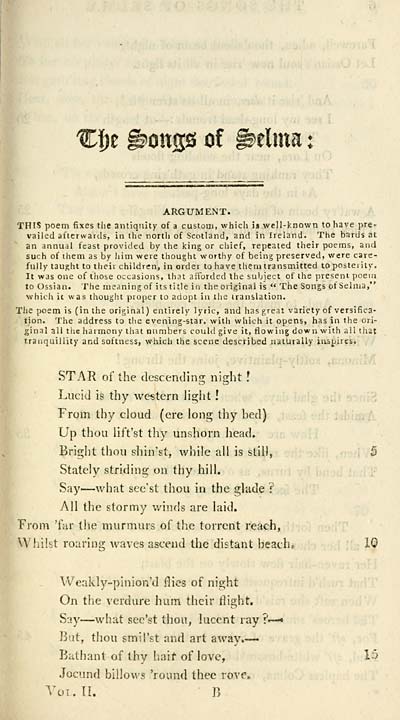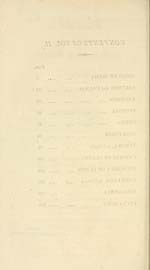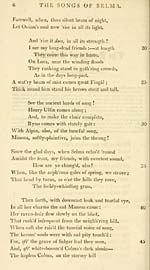Ossian Collection > Poems of Ossian
(235)
Download files
Complete book:
Individual page:
Thumbnail gallery: Grid view | List view

%^t g^ouss of i^elma :
ARGUMENT.
THIS poem fixes the antiquity of a custom, which is well-known to have pre-
vailed afterwards, in the north of Scotland, and in Ireland. The bards at
an annual feast provided by the king or chief, repeated their poems, and
such of them as by him were thought worthy of being preserved, were care-
fully taught to their children, in order to have them transmitted to posterity.
It was one of those occasions, that afforded the subject of the present poeui
to Ossian. The meaning of its title in the original is " The Songs of Selma,"
which it was ihouglit proper to adopt in the translation.
Tiie poem is (in the original) entirely lytic, and has great variety of versifica-
tion. The address to the evening-star, with which it opens, has in the ori-
ginal all the harmony that numbers could give it, flowing down with all that
tranquillity and softness, whicli the scene described naturally inspires.
STAR of the descending night !
Lucid is thy western light !
From thy cloud (ere long thy bed)
Up thou lift'st thy unshorn head.
Bright thou shin'st, while all is still, 5
Stately striding on thy hill.
Say' — what see'st thou in the glade ?
All the stormy winds are laid.
From 'far the murmurs of the torrent reach,
Whilst roaring waves ascend the distant beaih» 10
Weakly-plnion'd flies of night
On the verdure hum their flight.
Say — what see'st thou, lucent ray F-— «
Bat, thou smil'st and art away.—
Bathant of thy bait of love,
Jocund billows 'round thee rove.
'ot.II. B
ARGUMENT.
THIS poem fixes the antiquity of a custom, which is well-known to have pre-
vailed afterwards, in the north of Scotland, and in Ireland. The bards at
an annual feast provided by the king or chief, repeated their poems, and
such of them as by him were thought worthy of being preserved, were care-
fully taught to their children, in order to have them transmitted to posterity.
It was one of those occasions, that afforded the subject of the present poeui
to Ossian. The meaning of its title in the original is " The Songs of Selma,"
which it was ihouglit proper to adopt in the translation.
Tiie poem is (in the original) entirely lytic, and has great variety of versifica-
tion. The address to the evening-star, with which it opens, has in the ori-
ginal all the harmony that numbers could give it, flowing down with all that
tranquillity and softness, whicli the scene described naturally inspires.
STAR of the descending night !
Lucid is thy western light !
From thy cloud (ere long thy bed)
Up thou lift'st thy unshorn head.
Bright thou shin'st, while all is still, 5
Stately striding on thy hill.
Say' — what see'st thou in the glade ?
All the stormy winds are laid.
From 'far the murmurs of the torrent reach,
Whilst roaring waves ascend the distant beaih» 10
Weakly-plnion'd flies of night
On the verdure hum their flight.
Say — what see'st thou, lucent ray F-— «
Bat, thou smil'st and art away.—
Bathant of thy bait of love,
Jocund billows 'round thee rove.
'ot.II. B
Set display mode to: Large image | Transcription
Images and transcriptions on this page, including medium image downloads, may be used under the Creative Commons Attribution 4.0 International Licence unless otherwise stated. ![]()
| Early Gaelic Book Collections > Ossian Collection > Poems of Ossian > (235) |
|---|
| Permanent URL | https://digital.nls.uk/77559596 |
|---|
| Description | Selected books from the Ossian Collection of 327 volumes, originally assembled by J. Norman Methven of Perth. Different editions and translations of James MacPherson's epic poem 'Ossian', some with a map of the 'Kingdom of Connor'. Also secondary material relating to Ossianic poetry and the Ossian controversy. |
|---|
| Description | Selected items from five 'Special and Named Printed Collections'. Includes books in Gaelic and other Celtic languages, works about the Gaels, their languages, literature, culture and history. |
|---|

